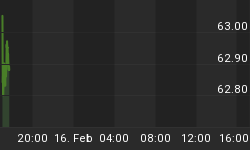There is something very striking going on in the inflation markets, and among investors. It only recently struck me, after attending an inflation conference last week and then today participating in two discussions: one with the CIO of a large insurance company and one with a group of senior people at a large asset management firm.
If it were only that the senior people at the large asset management firm were reporting that "people are not concerned with inflation right now," I would dismiss it. There are lots of things that investors and consumers are concerned about that the senior people at large asset management firms have no idea about. The anecdotal reports from the inflation dealers at the inflation conference carry more weight, because they're at least focused on having that specific conversation with their clients. But the clincher was the discussion with an insurance company CIO, who reports they are definitely going to be putting on some small inflation hedges because they hedge possibilities, not probabilities, but that they actually think deflation is more of a threat here than inflation.
I want to first show a chart of rolling 10-year inflation in the Federal Reserve era (source: Enduring Investments), compared with the current level of 10-year inflation breakevens. With the exception of the Great Depression, when the Fed tightened policy as money velocity declined in a manifest error, inflation has almost never been below the current level on a compounded 10-year basis. And it has never, with that singular exception, been very far below the current level. Ergo, inflation insurance is very cheap, even though 10-year breakevens are not far from all-time highs (since TIPS began, in 1997).

The refrain is that "we might get inflation in a few years, and we'll look to hedge then," but I don't see how that makes any sense if the cost to insure now is so all-fired low. It isn't as if you're giving up lots of high-yielding opportunities to buy this insurance. If the opportunities to increase return are very poor, shouldn't one take advantage of cheap opportunities to reduce risk? It seems odd to me.
I am also flummoxed at this perspective in the context of both business risk and career risk. I alluded to this issue yesterday. Sure, maybe "we all know" that even though M2 has until recently been growing at rates that have only been associated with post-disaster Fed accommodations (after 9/11) or inflationary periods (1980s, 1970s), inflation won't rise because Europe is a mess, but let's briefly consider the alternative future history. Suppose that in five years, you are an investor or asset manager and sitting with a spouse or a client or a boss, and the price level has increased 50% from here. And the spouse/client/boss says "you know, Fred, we're wondering why you didn't load up on cheap inflation protection. I understand why you didn't do it in 2009, but once the Fed started unlimited QE and every central bank in the world was doing similar things, didn't you think it made sense to put on some protection? I mean, there's always inflation when there's too much money in the system." What possible defense does Fred have? Is "our economists didn't think that was going to happen" going to be a valid defense?
Now obviously, by no means is this sense universal, but it seems insanely widespread. It seems as if the intelligentsia has been persuaded that since all of the proletariat is concerned about inflation, but the smart people at the Fed are not, then they ought to bet with the Fed. I have news for these folks: the man on the street is far better at forecasting employment, and certainly no worse at forecasting inflation, than the bow-tied, blue-chip economist at a Wall Street firm or large insurance company - especially when that inflation view is adjusted for common perceptual errors that we can roughly quantify.
It's generally true that today's generation of investors thinks "bad inflation" is 3% and is frequently unconcerned. But in 2009 and 2010 and 2011, there were certainly investors who were beginning to get worried, which is why TIPS yields are way down here at -0.86% in the 10-year part of the curve. Nowadays, the refrain seems to be "we may need product for our retail clients," but otherwise "remain calm, all is well."
But I think that's also what they told the people on board the Titanic. At some point, regardless of what the authorities are forecasting, investors need to grab for their life jackets or to head for the stairs anyway (and if I sound frustrated, it's because we're trying to hand people life preservers and they keep going back belowdecks). The worst thing that can happen if you're wrong is that you're feeling foolish, standing freezing on the deck of the ship and all really is well. The "Titanic Decision" matrix is below. I can tell you one thing: there is a single box there that I am pretty sure I want to avoid. What about you?

















